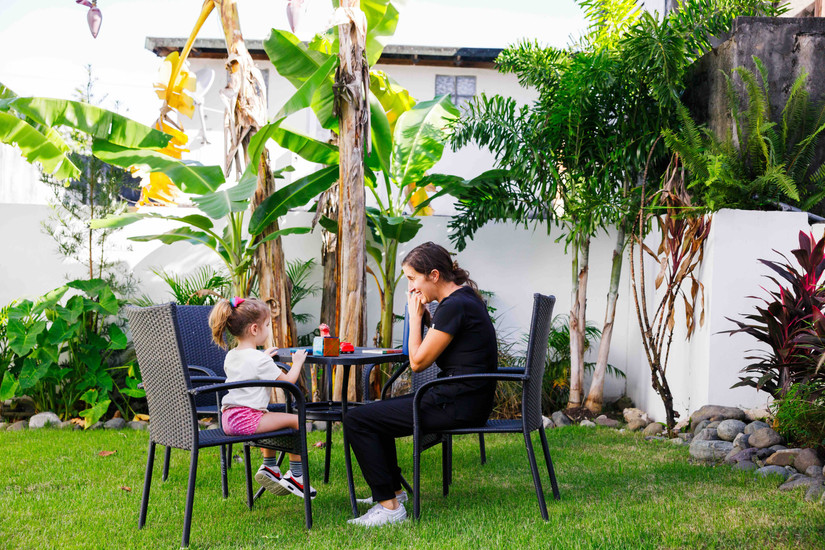Calm is Contagious: How Nervous System Regulation Transforms the Dental Experience—for Children and Adults
- Beth Rosellini
- May 1, 2025
- 4 min read
At Dorado Dental Wellness, we believe your experience at the dentist is about more than just teeth. It’s about trust, safety, and how your body and mind respond to the environment around you. That’s why we’ve built our practice around a powerful yet often overlooked principle in healthcare: nervous system regulation.

What Is Nervous System Regulation—and Why Does It Matter?
Your nervous system is your body’s command center, responsible for responding to stress, pain, joy, connection, and everything in between. When it’s regulated, you feel safe, grounded, and capable of handling challenges. But when dysregulated—overstimulated, anxious, or stuck in “fight or flight”—even routine experiences like a dental visit can feel overwhelming.
In today’s world, chronic stress, lack of sleep, fast-paced schedules, and constant digital input all make it harder to stay regulated. This matters because nervous system dysregulation doesn’t just affect your mood—it contributes to inflammation, poor immunity, disrupted healing, and even long-term chronic disease. Studies show that chronic stress can directly influence periodontal disease progression, healing after surgery, and pain tolerance during procedures.
Nature, Movement, and Breath: Tools to Recenter
Science has validated what many of us feel instinctively—time in nature, movement, deep breathing, mindfulness, and even creative expression help regulate the nervous system. At our practice, we encourage walks outside before or after appointments, provide handouts on breathwork for anxiety, and offer gentle guidance for grounding techniques. These small tools can have a big impact on inflammation, pain perception, and the overall dental experience.
Creating Calm for Kids: Especially Those with Sensory Sensitivities
Children, especially those with neurodivergent traits or sensory sensitivities, are deeply affected by the dental environment. Harsh lights, unfamiliar textures, buzzing tools, and new tastes can trigger dysregulation fast.
Our approach draws on philosophies like Dr. Becky Kennedy’s Good Inside, The Nurture Revolution by Dr. Greer Kirshenbaum, and the broader gentle parenting movement, all of which highlight the importance of connection over correction. These frameworks are built on the neuroscience of co-regulation—how a calm adult can help soothe a dysregulated child.
This is why we welcome parents into treatment rooms, use noise-canceling headphones, give children choice and voice, and avoid restraints like papoose boards. Research shows that children who experience fear and helplessness during medical care are significantly more likely to develop medical and dental phobias as adults.
Said a different way, a big part of pediatric dental appointments is about building rapport, setting the child up to love the dentist so they can have a lifetime of healthy and happy smiles. The clinic can be a challenging environment, so being able to balance that with a fun time in the backyard looking for lizards, checking out the bananas, or listening to the birds chirp can make all the difference for our littlest and youngest smilers. I genuinely care about my patients, and I want to take the time to get to know them so that they know that going to the doctor can be a helpful place to support health and well-being and have fun too.
Adults Need Co-Regulation Too: Healing Past Dental Trauma
It’s not just kids who benefit from a regulated, supportive environment. Many adults carry unresolved dental trauma—from painful procedures, being shamed, or feeling out of control. These early experiences can imprint deeply on the nervous system and cause real anxiety or panic in the dental chair decades later.
We hold space for that. Our team is trained to notice signs of stress and work gently to co-regulate in those moments. Whether through slower pacing, breath cues, soothing tone, or simply asking what you need—we’re here to restore a sense of safety and agency.

Why We Obsess Over the “Vibe”
Everything about our office is designed with this in mind: lighting, music, scent, layout, materials, and team energy. It’s not just about aesthetics—it’s neuroscience. The polyvagal theory teaches us that environments can either signal “safe to rest” or “prepare to defend.” We want your body to feel the former the moment you walk in.
And we don’t just do this for our patients—we do it for ourselves. A calm environment helps our team stay emotionally available, thoughtful, and resilient. When we regulate our nervous systems, we create a ripple effect of calm and care throughout your visit.
The Bottom Line: Dentistry Can Be Healing
We’re rewriting the story of what dental care feels like—one patient, one nervous system, one appointment at a time. Whether you’re a parent seeking care for your sensory-sensitive child, or an adult working through years of dental fear, you are welcome here exactly as you are.
Because here’s the truth: you don’t need to “tough it out.” You need to feel safe.
Want to learn more about co-regulation and emotional safety in healthcare? We recommend:
Good Inside by Dr. Becky Kennedy
The Nurture Revolution by Dr. Greer Kirshenbaum
The Polyvagal Theory by Dr. Stephen Porges
"Patient-centered communication and dental anxiety" – Journal of the American Dental Association (2020)
“Psychological stress and wound healing” – Nature Reviews Immunology (2004)
.png)










Comments